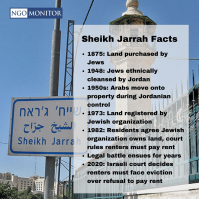Primer on Sheikh Jarrah Property Claims
 On February 10, 2021, the Jerusalem District Court1 upheld an October 2020 Jerusalem Magistrate Court2 decision, requiring a number of Sheikh Jarrah residents to vacate properties they are living in by May 2, 2021. Following this decision, the residents appealed to the Supreme Court. The Court has given the two sides until May 6, to report if they have reached a compromise to settle out of court.
On February 10, 2021, the Jerusalem District Court1 upheld an October 2020 Jerusalem Magistrate Court2 decision, requiring a number of Sheikh Jarrah residents to vacate properties they are living in by May 2, 2021. Following this decision, the residents appealed to the Supreme Court. The Court has given the two sides until May 6, to report if they have reached a compromise to settle out of court.
These developments have been the source of extensive NGO campaigning- particularly by the Palestinian group, Al-Haq- including submissions to the International Criminal Court (ICC) and to UN officials, alleging that the court order and the expected forcible removal represent war crimes.
Such claims and campaigns distort, obfuscate, and erase the facts of the case, as litigated over 50 years in multiple Israeli courts.
Legal status of the property3
- According to the Supreme Court, the land in question “was owned by Chief Rabbi (Hacham Bashi) Avraham Ashkenazi and Chief Rabbi Meir Orbach until the War of Independence [1948], after they purchased it in 1875 from its Arab owners.”
- Subsequently, two Jewish organizations, Va’ad Eidat HaSfaradim and Va’ad HaKlali L’Knesset Yisrael, worked to register the land with British Mandatory government in 1946.
- The properties were registered with Israeli authorities under these two organizations in 1973.
- These organizations sold the properties to the Nahalat Shimon organization in 2003.
Status of the residents
According to a 1989 High Court decision, and re-affirmed repeatedly in subsequent cases, as in the case of any tenant living on someone else’s property, residents living on the land owned by these organizations were required to pay rent to the organizations that owned the properties.4 Their failure to do so, along with instances of illegal building and illegally renting properties to others, resulted in the current legal proceedings against them, culminating in the District Court decision.
Crucially, in 1982, a number of residents- including those whose descendants appealed to the District Court- agreed in Magistrate Court that the 2 Israeli non-profits were the legal land owners.5
How did the District Court address the current residents’ claims of ownership?
The District Court case addressed the ownership claims of the eight appellants. The court found that:
- Three of the appellants are the children and grandchildren of residents who acknowledged the ownership of the Israeli organizations in court proceedings in 1982.
- Four of the appellants claim to have purchased the properties in 1991— 19 years after the properties were registered under the Israeli groups — from a man named “Ismail.” The court notes that the appellants never identified “Ismail,” nor did they prove that they had indeed purchased the properties from this person.
- One appellant represents the estate of a deceased former resident. In 2009, the Court determined that she had not paid rent as required, had built illegally on the property, and therefore could be evicted.
Previous court decisions on the ownership of the property
In October 2020, the Magistrate Court rejected the residents’ claim that the property had been promised to them by the Jordanian authorities, during the years in which Jordan controlled the area. According to that decision, “all of the witnesses were born after 1967 or were very young at the time and testified that they heard about the [Jordanian] promise from an older relative.”
The court added that “the only document presented” to prove this alleged Jordanian guarantee “is a copy of a standard document from the Jordanian equivalent of the Housing Ministry, but this form is un-signed and does not bestow ownership on any of the defendants.”
Similarly, earlier Supreme Court decisions rejected ownership claims of Sheikh Jarrah residents based on what the court found to be an apparently altered Turkish deed and an “inauthentic” contract.6
Moreover, in 2020, the Magistrate Court noted, “throughout all of the deliberations, the defendants claimed through their counsel that they were not tenants but rather held the property rights… Apparently, as they realized that they had not convinced the Court that they were the owners of the property, the defendants claimed for the first time that they are tenants who should not be removed from their homes.”
Footnotes
- 2021 Jerusalem District Court, case 57595-11-20
- The Jerusalem Magistrate combined the following related cases into one hearing 52633-12-10, 6629/09, 9939/09, 6679/09
- 2009 Supreme Court case 23647/99
- Jerusalem District Court, case166/89 , Supreme Court, case 6001/98 , Jerusalem Magistrate Court, case 3258/00, Jerusalem District Court, case 3304/01, Jerusalem District Court, case 6482/02
- 1982 Jerusalem Magistrate Court case 3457/82
- Jerusalem District Court, case 1465/97, Jerusalem Magistrate Court, case 23647/99 , 2005 Supreme Court, case 4126/05
